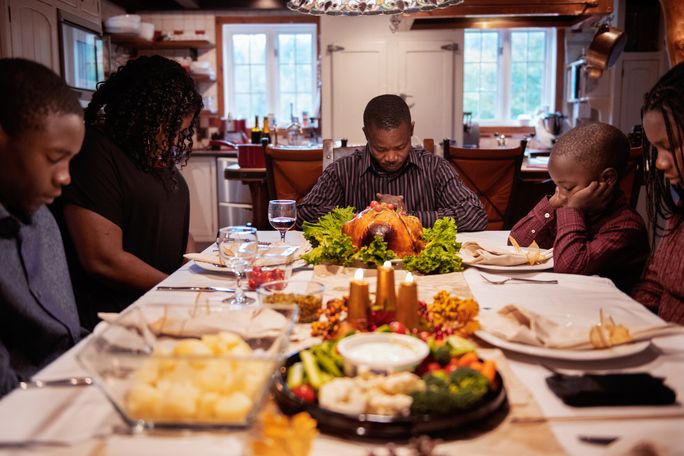.
Does Jerusalem Belong to Israelis or Palestinians?
“The status of Jerusalem continues to be a controversial issue dividing the world. Does it belong to Israelis or Palestinians? Or to Someone else?

A group of Palestinians pray outside Jerusalem’s Old City while Israeli forces stand guard on Oct. 20, 2023 (AP Photo/Mahmoud Illean).
On Oct. 7, 2023, the terror group Hamas launched what they termed, “Operation Al-Aqsa Deluge.” Their goal was to rid Palestine and Jerusalem of Jews, who, they believe, occupy the territory illegally. Hamas leader Khaled Mash’al called for the Islamic community to join the holy war in the battle for the Al-Aqsa Mosque.
To understand this, we must understand the importance of the Al-Aqsa Mosque in the Islamic faith. Muhammad founded Islam in the seventh century, setting up Mecca and Medina as the two holiest sites in Islam. Both cities are located in modern-day Saudi Arabia.
According to Muslims, Muhammad was miraculously transported from Mecca to Jerusalem, the site of the Al-Aqsa Mosque, which means the “farthest mosque,” where we are told he met Jesus and the prophets and led them in prayer before being taken up to heaven from the site of the Dome of the Rock.
After Muhammad’s death in 632, his second successor, Omar bin al-Khattab, conquered Jerusalem and built a mosque on the Temple Mount.
He claimed this Jerusalem mosque to be at the location of Muhammad’s night journey. Hence, it became known as the Al-Aqsa Mosque. Because of this, Jerusalem, and the Temple Mount in particular, became the third holiest site in Islam, behind the holy sites of Mecca and Medina. However, readers should understand that the city of Jerusalem is not mentioned by name in the Koran.
The Jewish claim to Jerusalem
The Jews claim Jerusalem as their capital and the Temple Mount as their most holy place of worship, because it was the location where the first and second temples stood.
Due to the nation’s disobedience, God’s presence left the first temple, and the building was destroyed by the Babylonians (Jeremiah 52:12-13; Ezekiel 9:3; 10:4, 18-19; 11:22-23).
The second temple was constructed under the leadership of Ezra, Haggai, Zechariah and Zerubbabel. However, the Romans destroyed the second temple in A.D. 70.
Today, some Jews seek to build a third temple, which the Palestinians and many Muslims believe will be at the expense of the Al-Aqsa Mosque. Some hardline Jewish Orthodox groups do believe the Al-Aqsa Mosque must be destroyed for the third temple to take its place. In many ways, the Al-Aqsa Mosque is the center of the conflict between Palestinians and Israelis.
(To learn of this conflict’s ancient roots, read “What’s Behind the War Between Israel and Hamas?”)
The Christian claim to Jerusalem
For Christians, Jerusalem is holy because it was the birthplace of Christianity. During the Dark Ages, it was the center of many battles between Muslims and Christians.
Prophecy shows that European forces will once again capture Jerusalem, setting off a series of events leading to Christ’s return.
Jerusalem was first captured by Christians in the First Crusade (1099) under the leadership of Pope Urban II. But Christian control was soon lost to Muslim forces led by Saladin in 1187.
There were nine crusades, but the Christian forces were largely unsuccessful in their fight the Islamic armies to regain control of Jerusalem.
Though Europe today is largely secular, Bible prophecy shows that European forces fighting under a Christian banner will once again capture Jerusalem, setting off a series of events leading to Christ’s return. Christ warned, “But when you see Jerusalem surrounded by armies, then know that its desolation is near” (Luke 21:20).
To learn more, read “What Is the Abomination of Desolation?”
A city of war
With three faiths claiming Jerusalem, it is the most contested city in the world. In recent history, there have been several wars over the city.
At the inception of the modern nation of Israel in 1948, the Arab nations of Lebanon, Syria, Iraq, Jordan and Egypt attacked the fledgling nation, intending to utterly destroy it.

This image shows the three religious sites that are a source of conflict at the Temple Mount: the Dome of the Rock (left), the Western Wall (center) and the Al Aqsa Mosque (right).
The result was a victory for Israel, but Jerusalem remained divided—with West Jerusalem under Israel’s control and East Jerusalem under Jordan’s control.
On June 7, 1967, Israeli forces took control of Jerusalem and the Temple Mount during the Six-Day War.
They declared Jerusalem “the eternal and undivided capital of the Jewish State,” but to ease conflict over the Temple Mount, they appointed the Jordanian Ministry of Religious Endowments (“Waqf”) as the custodians of the holy site, which continues to this day. The Waqf does not allow non-Muslims to pray on the Temple Mount, a status that Jews try to contest.
On Oct. 6, 1973, Egypt and Syria launched the Yom Kippur War, a surprise attack on the solemn Day of Atonement (Yom Kippur). They aimed to regain the territory they lost during the 1967 Six-Day War.
Now, 50 years later, almost to the day (Oct. 7, 2023), on the festival of the Eighth Day (Shemini Atzeret), Hamas launched “Operation Al-Aqsa Deluge” to expel Jews from Israel and Jerusalem.
Contention over the Temple Mount
The Temple Mount is constantly a place of tension. Consider the following headlines:
- “Hamas Commander Says Attacks Are in Defense of Al-Aqsa, Claims 5,000 Missiles Fired” (October 2023).
- “Israeli Settlers Storm Al-Aqsa Mosque Complex on Fifth Day of Sukkot” (October 2023).
- “‘The Time Has Come’: Jews Arrested En Route to Temple Mount Sacrifice” (June 2023).
- “The Israelis Set for New Jewish Temple on Al-Aqsa Site” (May 2023).
- “Ben-Gvir Visits Temple Mount: ‘We Are the Owners of Jerusalem and Israel’” (May 2023).
- “Violence Erupts Again at Jerusalem’s Al-Aqsa Mosque” (April 2023).
- “Six Extremist Jews Arrested for Planning Animal Sacrifice Atop Temple Mount” (April 2022).
The Bible calls the city a “very heavy stone for all peoples,” meaning it will be a burdensome problem for all nations that entangle their affairs with the city (Zechariah 12:3). The question remains: Who has the right to call Jerusalem their capital?
To learn more, read “Temple Mount: Its History and Future.”
The rightful owner of Jerusalem
The most popular solution for Jerusalem is known as the two-state solution. A common form of this proposes that Jerusalem be divided and returned to its pre-1967 borders, with West Jerusalem given to Israelis and East Jerusalem given to Palestinians.

Prophecy shows that before Jesus Christ’s return, the nations will be gathered against Jerusalem and the city divided
Bible prophecy shows that before Jesus Christ’s return, the nations will be gathered against Jerusalem and the city divided (Luke 21:20). But it will not be a solution, nor will it be peaceful. Half the city and inhabitants will be “taken” violently (Zechariah 14:2).
Then Christ will return to earth and punish the nations responsible for this (Joel 3:2).
But what happens after that will be a remarkable transformation. Jesus Christ will establish His world capital at Jerusalem! This shows that the holy city does not belong to any one nation or religion—but belongs to God Himself.
In Zechariah 2:12 God says He “shall choose Jerusalem again” (King James Version). Notice the following prophecies that show what He has planned for the city:
- People around the world will go to Jerusalem to learn God’s laws (Isaiah 2:3; Micah 4:2).
- Many nations will visit Jerusalem and be considered God’s people (Zechariah 2:11).
- Jesus will rule and judge the nations from Jerusalem (Zechariah 14:9; Isaiah 2:4; Micah 4:3).
- The inhabitants of Jerusalem will live in perfect safety (Zechariah 14:11).
- Spiritual healing will go forth from the city to the rest of the earth (Zechariah 14:8; Ezekiel 47:1-2, 3-4, 5-6, 7-9, 10-12).
The Bible instructs us to “pray for the peace of Jerusalem” (Psalm 122:6). That means the return of Jesus Christ and the establishment of His Kingdom on earth. Only then will it fulfill the meaning of its name: The City of Peace.”” From: https://lifehopeandtruth.com/prophecy/blog/who-does-jerusalem-really-belong-to/?
________
The Human Potential
Psalm 8:6-8
“You have made him to have dominion over the works of Your hands; You have put all things under his feet, all sheep and oxen—even the beasts of the field, the birds of the air, and the fish of the sea that pass through the paths of the seas.
At creation God gave humanity dominion—rulership—over the earth and the other creatures on it (Genesis 1:26-28). God intended for us to learn proper stewardship of what He gave us, and in the process of tending and keeping it, to grow in godly character. But our first parents chose the way of selfishness and shortsightedness, and humanity ever since has misused its dominion and befouled our planet.
The author of Hebrews shows that God’s intention goes beyond even the earth and its creatures. “For in that He put all in subjection under him, He left nothing that is not put under him. But now we do not yet see all things put under him” (Hebrews 2:8).
God truly meant all things—the whole universe! Jesus Christ came and died that we might be forgiven and offered that wonderful potential as the glorified children of God ( Hebrews 2:9-10 ).”
For more about this awesome potential, see our article on the “Purpose of Life.” From: https://lifehopeandtruth.com/bible/blog/the-human-potential/
________
Avoiding Cholesterol is a No-Brainer
“Eggs and brains are the two most concentrated sources of cholesterol in the diet.
Transcript of video at: https://nutritionfacts.org/video/avoiding-cholesterol-is-a-no-brainer/
Below is an approximation of this video’s audio content. To see any graphs, charts, graphics, images, and quotes to which Dr. Greger may be referring, watch the above video.
“The egg industry would rather blame the bacon or hash browns, railing against this myth that eggs are the most concentrated source of dietary cholesterol. And it’s true, they’re right. It is a myth. According to the official USDA nutrient database, in a list of the most concentrated cholesterol sources, eggs are not #1; they’re #2. Brains are #1. Veal brains, cow brains, pig brains, lamb brains, raw pig brains, more veal brains, and then eggs. Then more brains, eggs, brains, brains, eggs, brains, eggs, and eggs. The take-home message? If you’re going to do veal brains? Pan-fried, definitely; not braised.
What about omega-3-rich eggs? “The new type of eggs containing omega-3 fatty acids are still loaded with cholesterol,” the Director of the Stroke Prevention & Atherosclerosis Research Centre notes. “The answer is not to feed flax seed to the chickens, but rather to put it on the cereal and leave the chicken out of the meal!”
The devastating new review published last year implicating egg consumption did not go over easy with the egg industry. They countered that the overly restrictive 200mg upper safety limit for cholesterol intake, that wouldn’t even allow a single egg, is only for people at risk for heart disease—to which the lead researcher replied, “[Most everyone is] at risk of vascular disease—the only ones who could eat [an] egg yolk regularly with impunity would be those who expect to die prematurely from nonvascular causes…” In other words, his famous “The only [people] who should eat eggs regularly are those [dying of] a terminal illness”—because at that point, who cares? You’re going to drop dead anyway.”
In their landmark review, they conclude that waiting until your first stroke, heart attack, or diabetes diagnosis to avoid eggs is too late. They conclude: “Stopping egg consumption after a [heart attack] or stroke would be like quitting smoking after [a diagnosis of] lung cancer: a necessary action, but late.” From: https://nutritionfacts.org/video/avoiding-cholesterol-is-a-no-brainer/
But…….. also see infographic and article all about eggs at: https://www.mercola.com/infographics/egg-nutrition-facts.htm
_________
 “The Thanksgiving holiday is widely publicized and celebrated by millions of Americans. But shouldn’t we be thankful every day?
“The Thanksgiving holiday is widely publicized and celebrated by millions of Americans. But shouldn’t we be thankful every day? “The Bible has stories about people facing loneliness and solutions to loneliness. God understands and cares and doesn’t want us to suffer alone.
“The Bible has stories about people facing loneliness and solutions to loneliness. God understands and cares and doesn’t want us to suffer alone. “The world doesn’t recognize pride as a problem, so how do we overcome something so sly and seemingly harmless?
“The world doesn’t recognize pride as a problem, so how do we overcome something so sly and seemingly harmless? 










